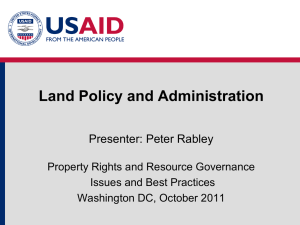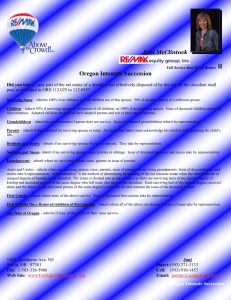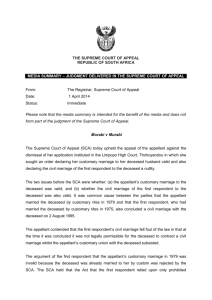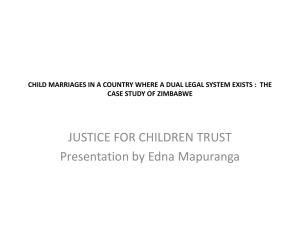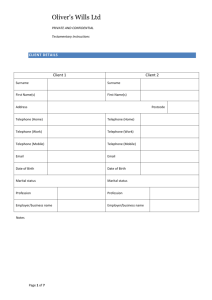Clause no
advertisement
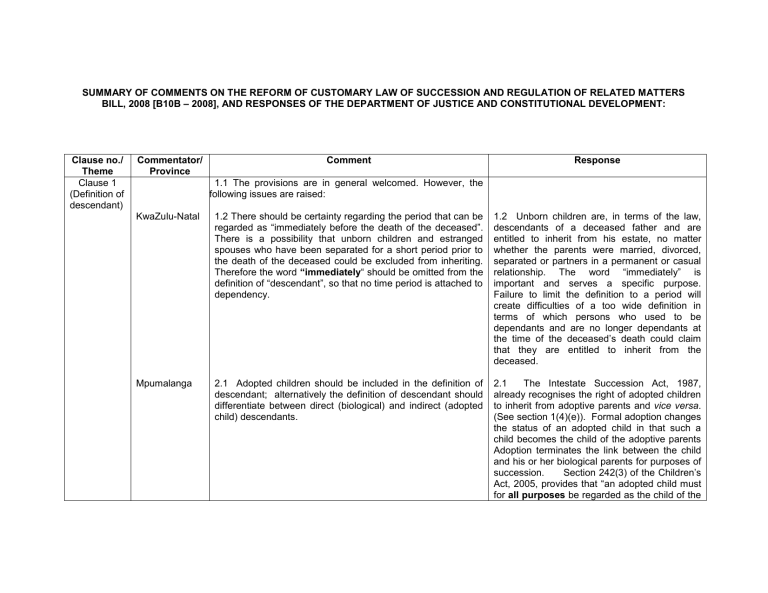
SUMMARY OF COMMENTS ON THE REFORM OF CUSTOMARY LAW OF SUCCESSION AND REGULATION OF RELATED MATTERS BILL, 2008 [B10B – 2008], AND RESPONSES OF THE DEPARTMENT OF JUSTICE AND CONSTITUTIONAL DEVELOPMENT: Clause no./ Theme Clause 1 (Definition of descendant) Commentator/ Province Comment Response 1.1 The provisions are in general welcomed. However, the following issues are raised: KwaZulu-Natal 1.2 There should be certainty regarding the period that can be regarded as “immediately before the death of the deceased”. There is a possibility that unborn children and estranged spouses who have been separated for a short period prior to the death of the deceased could be excluded from inheriting. Therefore the word “immediately“ should be omitted from the definition of “descendant”, so that no time period is attached to dependency. 1.2 Unborn children are, in terms of the law, descendants of a deceased father and are entitled to inherit from his estate, no matter whether the parents were married, divorced, separated or partners in a permanent or casual relationship. The word “immediately” is important and serves a specific purpose. Failure to limit the definition to a period will create difficulties of a too wide definition in terms of which persons who used to be dependants and are no longer dependants at the time of the deceased’s death could claim that they are entitled to inherit from the deceased. Mpumalanga 2.1 Adopted children should be included in the definition of descendant; alternatively the definition of descendant should differentiate between direct (biological) and indirect (adopted child) descendants. 2.1 The Intestate Succession Act, 1987, already recognises the right of adopted children to inherit from adoptive parents and vice versa. (See section 1(4)(e)). Formal adoption changes the status of an adopted child in that such a child becomes the child of the adoptive parents Adoption terminates the link between the child and his or her biological parents for purposes of succession. Section 242(3) of the Children’s Act, 2005, provides that “an adopted child must for all purposes be regarded as the child of the 2 Clause no./ Theme Commentator/ Province Comment Response adoptive parent and an adoptive parent must for all purposes be regarded as the parent of the adopted child.”. Section 1 of the Children’s Act, 2005, moreover defines “'adopted child” as “a child adopted by a person in terms of any law”. Likewise “adoptive parent” is defined as “a person who has adopted a child in terms of any law”. North West 3.1 The following words should be added to the definition of descendant: “those conceived and or born subsequent to the deceased’s death as well as those children who may have been considered illegitimate (or born out of wedlock) in terms of customary law, and those children adopted by the deceased”. 3.1 See paragraphs 1.2 and 2.1 above. Children born out of wedlock have the right to inherit from their natural parents, despite their status. They acquire the right to inherit from their mother’s husband through formal adoption Western Cape 4.1 Concern is expressed regarding the social impact the Bill might have. The definition of descendants is too broad, it must be limited to biological children. 4.1 See paragraphs 2.1 and 3.1 above. Consideration could possibly be given to limiting the scope of the definition, for instance to blood relations or children adopted in terms of customary law. 4.2 The extension of the meaning of adopted child to include children adopted in terms of customary law must be considered by the Select Committee. 4.2 In terms of the Intestate Succession Act, adopted children have the right to inherit from the adoptive parents. The definition of adopted child is broadened in order to place children adopted in terms of customary law on equal footing with children adopted in terms of the civil law and to dispel any perceptions that African customs are undermined at the expense of the civil law. Formally adopted children must be distinguished from children in foster care. Foster parenting does not change the status of a child but adoption does. A child under foster 3 Clause no./ Theme Clause 2 Clause 3 Commentator/ Province Comment Response Gauteng 1.1 The Bill assumes that customary unions are heterosexual in nature. It is a tradition of the Balobedu for the rain Queen to enter a recognised union with a woman so that such a woman can provide children to the Rain Queen. Children born out of such a union are not provided for in the Bill. care does not acquire the right to inherit from the foster parent and vice versa. 1.1 While the Bill does not make provision for any type of marriage, it recognises the right of children born out of ancillary unions, including those born out of customary unions between women to inherit. Children from these unions are entitled to inherit from the woman on whose behalf they were raised. Limpopo 2.1 The Bill should make provision for a single woman who does not have children of her own to marry another woman for the purpose of providing her with children. Children born out of such a union should inherit from a woman on whose behalf they were raised. 1.1 Despite the duration of the union/marriage, the deceased spouse’s estate should be divided equally among all the partners in a customary union. Mpumalanga 1.2 Because small children have more needs for maintenance than older and financially independent children, the portion allocated to an heir should be determined by age. The younger the child, the greater the share should be. Clause 4 Limpopo 1.3 Senior spouses in a customary union should have a greater share in the estate than junior spouses. 1.1 Children born out of wedlock should inherit from their biological fathers only. 2.1 See paragraph 1.1 above. 1.1 Clause 3(2) makes provision for the equal distribution of the estate between the spouses. 1.2 The provisions of the Intestate Succession Act will be used in calculating the share of each child. This Act treats all the children equally. Unequal distribution of the estate between the children could be challenged on the basis of unfair discrimination. Nothing precludes the older children from helping the younger ones in the spirit of ubuntu. 1.3 See paragraph 1.2 above. 1.1 Children born out of wedlock have the right to inherit from their natural parents despite their status. They only acquire the right to inherit from the mother’s husband through formal adoption. 4 Clause no./ Theme Commentator/ Province Mpumalanga Comment Response 1.2 Provision should be made in the Bill for the deceased’s children who were excluded from the will who are 21 years and older and who are still attending school, to inherit from the estate. 1.2 Testate succession in terms of which the deceased has left a valid will is regulated by the provisions of the Wills Act. Provided it is valid, the will of the deceased may not be interfered with. 1.3 Children born out of wedlock in respect of whom a fine/damages were paid should be entitled to inherit from their deceased biological father. 1.3 Children born out of wedlock are entitled to inherit from their biological parents even if customary damages have been paid to the mother’s parents. 1.4 Children born out of wedlock should inherit from their biological father only, and not from the step father. 1.4 Children born out of wedlock have the right to inherit from their biological parents despite their status. They only acquire the right to inherit from the mother’s husband if he adopted them formally in terms of the civil law or customary law. However, such children have the right to inherit from their mother even if she married someone else. 2.1 In order to protect spouses who enter into marriages with individuals who already have dependants who may then exploit the resources of the husband to the detriment of his dependants and vice versa, the following provisions should be added to clause 4: “(4) Where a prospective partner to a customary marriage already has minor children who are dependants and where such a person wishes to enter into a customary union and include children into the prospective family then the prospective spouses may negotiate the future proprietary rights of these dependant children. (5) These negotiations may be in writing or verbal and on the death of any of the spouses in the family unit that the dependant children were 2.1 Nothing precludes persons who are about to marry or who marry, from negotiating the proprietary consequences of their marriage. As marriage is a contract, individuals are free to negotiate the terms thereof within certain limits. It is not desirable to enact legislate that cannot be enforced. The parties are also free to make individual or joint wills that will incorporate their wishes with regard to their respective estates. 5 Clause no./ Theme Clause 5 Commentator/ Province Mpumalanga Northern Cape Clause 6 Clause 7 Comment incorporated into effect must be given according to the agreement that arose from the negotiations mentioned in section 4(4).”. 1.1 Traditional leaders should be involved in the investigation of disputes regarding the destination of family property. It is proposed that, before making a determination regarding the destination of family property, the matter should be referred to a magistrate and a traditional leader in the area. Response 1.1 The magistrate may call any person who can assist in the enquiry as a witness, including a traditional leader. 2.1 Before referring a dispute regarding the destination of family property to a magistrate for an enquiry, the Master of the High Court should refer the dispute to the traditional leader of the area to resolve disputes relating to a will in a customary marriage. 1.1 The Bill does not provide for what will happen when a traditional leader dies intestate. 2.1 See paragraph 1.1 above. The magistrate can call a traditional leader to testify regarding any matter pertaining to the enquiry. (If there is a will this legislation will not be applicable). Limpopo 2.1 In order to avoid prejudicing the descendants of a traditional leader in an intestate estate, there should be a clear indication as to what constitutes communal property. Gauteng 1.1 Concern is expressed regarding the proprietary rights in 2.1 What constitutes communal property will differ from case to case. The examples of the property a traditional leader may hold on behalf of a community could include the leopard skin worn by traditional leaders when they are installed or a place where meetings of the community are held. Providing an exhaustive list could be problematic in cases where specific property is not listed. This should be determined by the facts and the customs of the traditional community in question. 1.1 While the Bill does not deal with the validity Gauteng 1.1 Clause 6 of the Bill deals with this issue and makes an exception with regard to property that is held by a traditional leader on behalf of the traditional community. The personal property of a traditional leader is dealt with under clause 2(1) of the Bill, and his or her property will devolve in terms of the Intestate Succession Act, unless he or she has left a will. 6 Clause no./ Theme Commentator/ Province Comment Response civil and customary marriages as well as the status of such marriages. or otherwise of one marriage over the other, the Bill protects the proprietary rights of customary marriage spouses and their issue whose marriages were dissolved by the subsequent civil marriages between their husbands and other women during the period when this was not regulated. Mpumalanga 2.1 In order to protect women who enter into a customary marriage with the deceased after he has already entered into a civil marriage, protection should not be limited to any period and references to older legislation should be omitted. Therefore, clause 7 should be rephrased as follows: “(1) No person in any marriage will be discriminated against in any manner with regard to his or her proprietary rights and any issue thereof purely due to the nature of the marriage or because of the time at which he or she entered into such marriage. (2) Where a person has entered into a marriage in terms of the Marriage Act, 1961, and then entered into a customary marriage or where a person has entered into a customary marriage and subsequent to this union entered into a marriage in terms of the Marriage Act, 1961, then the widow or widower in the marriage constituted in terms of the Marriage Act, 1961, will have no greater rights in respect of the estate of the deceased spouse as he or she would have had the marriage been under customary law.”. 1. Although the Legislature resolved that the Bill be adopted without amendments, the following comments were raised: 2.1 See paragraph 1.1 above. The Recognition of Customary Marriages Act prohibits persons from concluding both customary marriages and marriage in terms of the Marriages Act at the same time and vice versa. Providing a blanket protection to such marriages would amount to condoning an action which is prohibited by law. It is, however, necessary to protect customary marriage spouses whose customary marriages were dissolved by subsequent civil marriages between 1927 and 1988 because, during that period, there was no statutory prohibition in this regard. Free State 1.1 The Bill is seems to favour women because they do not accept children born out of wedlock/step children because 1.1 A child born out of wedlock has the right to inherit from his or her natural parents, including General comments 7 Clause no./ Theme Commentator/ Province Gauteng Comment Response such children stand to benefit from the estate of the father. the father irrespective of whether the father’s spouse has accepted the child or not, provided paternity has not been denied and tested. 1.2 In order to avoid problems which are usually encountered after the death of the husband, the Bill must make provision for registration of customary marriages. 1.2 The registration of customary marriages is dealt with in the Recognition of Customary Marriages Act, 1998. 1.3 The law on polygamy should be revisited since it was acceptable because people were well off and could adequately provide for many families. 1.3 Noted. Polygamy is recognised by the Recognition of Customary Marriages Act, 1998. 1.4 The customs should be restored to the way they used to be, for example customary marriages, initiation schools, etc. 1.4 Noted. 1.5 There could be a problem if a girl child were to be appointed as a traditional leader and she marries and changes her surname to that of the clan into which she has married. 1.5 The Bill deals with intestate succession. Traditional leadership and recognition as a traditional leader is dealt with in the Traditional Leadership and Governance Framework Act, 2003. 2.1 The Bill does not seem to provide recourse for children born out of wedlock or out of a customary union the deceased would have entered into, where the estate was divided only among children born out of a civil marriage. 2.1 It would seem as if the commentator is referring to children born out of a marriage under the Marriages Act, 1961, who take preference. Any person entitled to a share in an intestate estate who has been deliberately or otherwise excluded as an heir already has remedies at his or her disposal: the Master of the High Court and the High Court. 2.2 Customary law is not practised in urban and peri-urban areas and there is no effort on government to educate communities about customary law. 2.2 Noted. The Department of Justice and Constitutional Development has included it in its communication strategy, awareness programmes in communities on the Bill and its implications. 8 Clause no./ Theme Commentator/ Province Limpopo Mpumalanga Comment Response 2.3 Do extra-marital children have the right to inherit from the father or mother? 2.3 Children born out of wedlock have the right to inherit from both parents. They can inherit from step parents who have adopted them formally, in which case they do not inherit from the biological father or mother, as the case may be, as their status would have changed. 2.4 The Bill needs to be popularised among communities. 2.4 See paragraph 2.2 above. 3.1 Customary law of succession should revisit the issue of inheritance through the bloodline in order to accommodate the situation where the deceased does not have direct descendants. 3.1 Noted. In terms of the Bill and the Intestate Succession Act, it is, however, possible for a person who may not necessarily be related to the deceased through the bloodline, to inherit from his or her estate. Adopted children also have the right to inherit from their adoptive parents. 3.2 The Bill should embrace African values and customs. This could be achieved by conducting an in-depth research into traditional councils and communities. 3.2 Noted. The South African Law Reform Commission consulted extensively with communities during the investigation phase of the Bill. 3.3 The Bill should address Euro-centric values and customs which undermine African values and customs. 3.3 The Bill which, in essence, gives effect to a Constitutional Court judgment, attempts to do this, despite the conflict that exists between the civil and customary law. The broadening of the definition of adopted child to include adoptions under customary law and allowing children born out of supporting/ancilliary unions to inherit, reflect this. 4.1 What happens in the case where a step child or a child born out of wedlock demands to take his or her biological father’s name once he or she has grown up because the 4.1 The name of a child does not affect inheritance. Children have a right to inherit from their parents. Adopted children also have a 9 Clause no./ Theme Commentator/ Province Comment Response father is wealthy? right to inherit from their adopted parents. If a step child has been formally adopted by the step father or mother, the status of that child changes to being a child of the adoptive parent for all intents and purposes and such child can inherit. It is possible for a child who has not been formally adopted to take the father’s name whether the father is wealthy or not. Whether a child takes the biological father’s name or not, the child is entitled to benefit from the biological father’s intestate estate. 4.2 Will a child born out of wedlock inherit from the estate of his or her biological father? Will the estate be accepted in the new family of such a child? 4.2 See paragraph 4.1 above. 4.3 According to IsiNdebele customs a child born out of wedlock takes the biological father’s surname. Why is such a child entitled to an inheritance from a different surname? 4.3 See paragraph 4.1 above. 4.4 If lobolo is paid for an extra-marital child that child is accepted into the family into which the mother is married. 4.4 If in the traditional practices of the particular community the payment of lobolo signifies(a) the customary law adoption, and (b) that the child is accepted as the adopted child of the mother’s husband or of the adoptive family, such a child will inherit from the mother’s husband and from not the biological father. 4.5 Is an extra-marital partner entitled to a share of a former partner’s estate? 4.5 There is no provision for an “extra-marital partner” in the law of intestate succession. 4.6 The Bakgatla practise a custom in terms of which the youngest male child remains in the family home. 4.6 The Bill abolishes the rule of primogeniture on the grounds of unfair discrimination on the basis of birth. The same argument will hold in respect of ultimogeniture. It is vital that there is 10 Clause no./ Theme Commentator/ Province Comment Response equal treatment of heirs. 4.7 Married female children should not benefit from the estate because the lobolo paid for her is part of that estate. 4.7 See paragraph 4.6 above. 4.8 When a male child marries the father gives him his share of the estate to establish a house. Therefore married children who are financially independent should not participate in the estate of the parents. 4.8 See paragraph 4.6 above. 4.9 A child born out of wedlock should be entitled to benefit from the estate of his or her mother 4.9 The Intestate Succession Act already makes provision for a child to inherit from its natural parents. 4.10 A child born out of wedlock should not be entitled to benefit from the estate of the head of the family. Only biological children may benefit from the estate of the family head. 4.10 Children born out of wedlock are not entitled to inherit from the head of the family unless such a child has been adopted. They inherit from their natural parents. 4.11 A child born out of wedlock should benefit from the estate of its grandparents only and not that of the step father. 4.11 In terms of the Intestate Succession Act, a person is entitled to inherit from grandparents if those grandparents do not have direct descendants. In terms of the Bill a grandchild could inherit if he or she is a dependant of a grandparent. A child will not inherit from a step father unless the step father has adopted the child. 4.12 All children irrespective of status in the family must be entitled to an equal share in the estate of the family head 4.12 The Intestate Succession Act makes provision for inheritance through the bloodline. Because of this, children born out of wedlock inherit from their biological fathers even if the father is not married to the mother. The Bill extends the definition of descendant by including dependants of the deceased. Only a 11 Clause no./ Theme Commentator/ Province Comment Response child born out of wedlock who has been formally adopted may inherit from the stepfather because the adoption has changed his or her status. A step father who wishes that a step child inherit from him can ensure this by making a will. Northern Cape 4.13 In order to avoid double benefit to an heir, the Bill should distinguish between an orphan and a child born out of wedlock whose biological father is still alive. 4.13 Nothing entitles an orphan who has not been formally adopted to inherit from the intestate estate of a person who is not its biological parent. Such a child would inherit from his or her (biological) parents. A child born out of wedlock also inherits from biological parents. Therefore there is no possibility of double benefit to either an orphan or a child born out of wedlock. 5.1 While the Bill is supported, it excludes men as dependants or possible heirs, it only covers women. Clause 2(1) of the Bill provides for the estate of any person which does not devolve in terms of a will to be regulated in terms of the Intestate Succession Act. The Intestate Succession Act applies to any person. Clause 2 makes reference to women in order to cover women who have entered into customary unions with men or other women for purposes of providing them with children while they are currently not regarded as spouses for purposes of succession.

